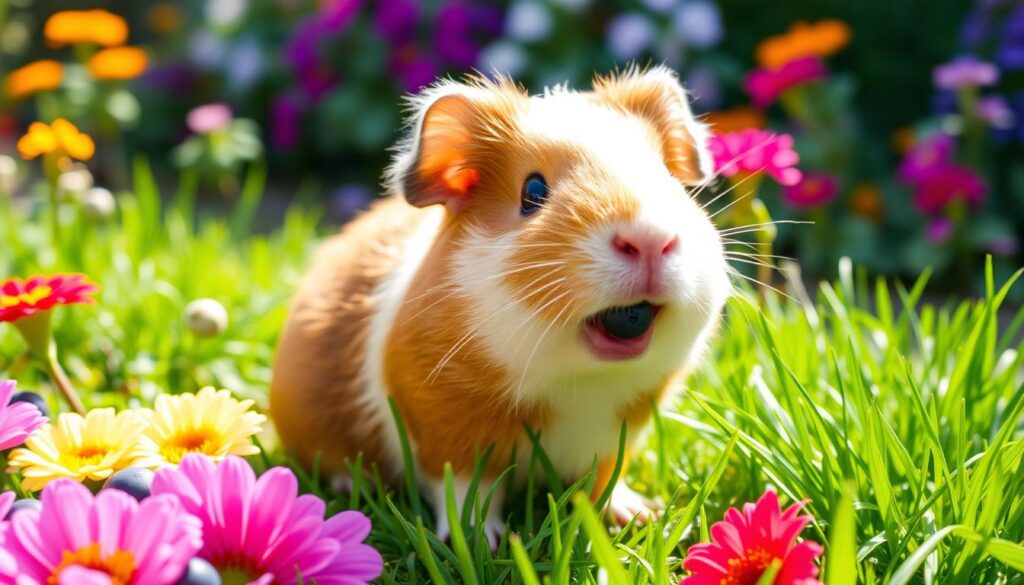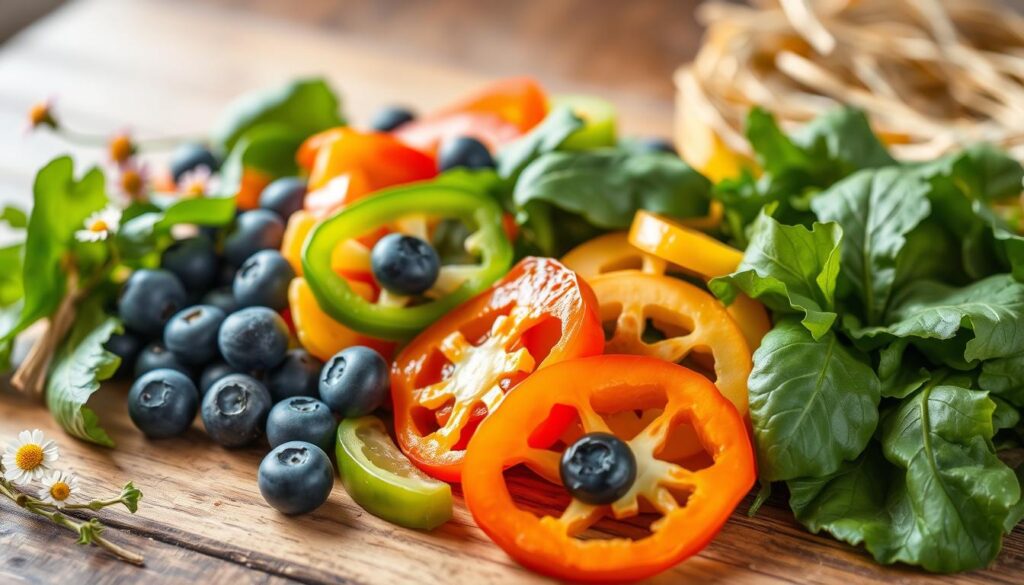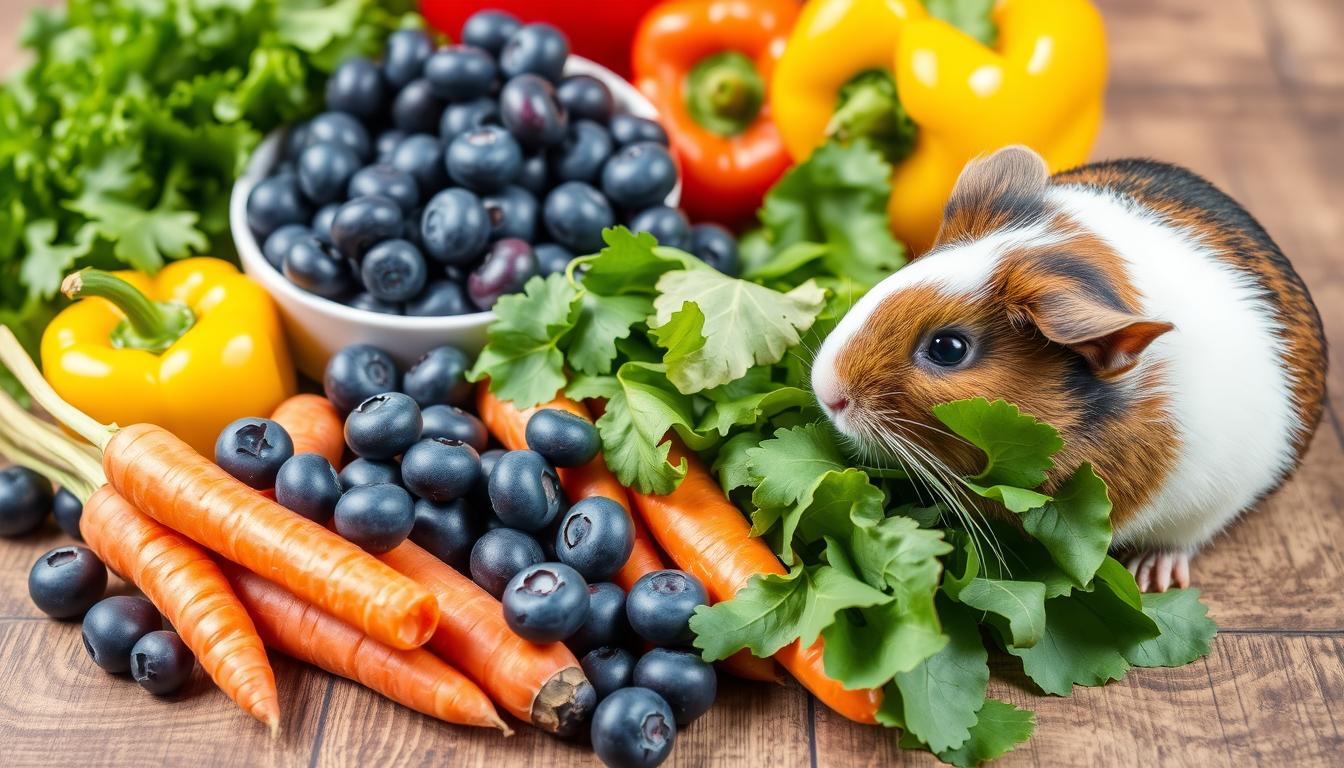If you own a guinea pig, you might wonder if they can have blueberries. The good news is that blueberries can be a tasty, occasional treat for them. But, it’s important to know how to add them to their diet the right way.
Table of Contents
Understanding Guinea Pig Nutrition Basics
Guinea pigs need the right food to stay healthy and happy. They have special dietary needs that keep them lively and long-lived. Let’s dive into the basics of what they should eat every day.
Essential Components of a Guinea Pig Diet
A good diet for guinea pigs includes:
- Unlimited high-quality grass hay, like timothy or orchard grass, which is key for fiber.
- A small amount of guinea pig-specific pellets, about 1/4 to 1/8 cup daily, for extra nutrition.
- Up to 1 cup of fresh, nutrient-rich veggies daily, like leafy greens, bell peppers, and carrots.
- Clean, fresh water always available.
The Role of Fresh Foods in Guinea Pig Health
Fresh fruits and veggies are also crucial for guinea pigs. They give important vitamins, minerals, and antioxidants. Choosing a variety of fresh foods helps keep your guinea pig healthy and balanced.
Daily Nutritional Requirements
Guinea pigs need specific nutrients every day. They must get enough vitamin C since they can’t make it themselves. They need 10-30 mg of vitamin C daily, more for young or sick ones.
They also need the right amounts of minerals like calcium, magnesium, and phosphorus. These are key for their health and growth.
Knowing about guinea pig nutrition helps you give them a diet that supports their health and happiness.
Can Guinea Pigs Have Blueberries
Yes, guinea pigs can have blueberries as an occasional treat. Blueberries are full of nutrients that are good for your cavy friends. But, remember to give them in small amounts because of their sugar.
Blueberries are rich in antioxidants, like anthocyanin, which helps protect your guinea pig. They also have vitamin C, which is important for preventing scurvy.
Even though blueberries are low in calories, they still have sugar. Give your guinea pig one or two small blueberries, about two times a week. This is a good way to treat them.
When you first give blueberries to your guinea pig, start with a little bit. Watch for any signs of upset stomach. Fresh blueberries are best, but thawed frozen ones are okay. Avoid dried blueberries because they have too much sugar.
Remember, blueberries should be a small part of your guinea pig’s diet. Their main food should be hay, fresh veggies, and a little bit of good pellets. This mix helps keep your cavy healthy and happy.
Nutritional Benefits of Blueberries for Guinea Pigs
Guinea pigs need a diet rich in fresh veggies, fruits, and hay for good health. Blueberries are a great choice because they’re full of vitamin C and antioxidants. They can be a tasty treat for your furry friend.
Vitamin C Content and Its Importance
Guinea pigs can’t make vitamin C like humans do. This vitamin is key for their immune system, collagen, and healing wounds. Blueberries have 9.7 mg of vitamin C per 100g, making them a great source.
Antioxidant Properties
Blueberries are packed with antioxidants. These help fight off oxidative stress and boost your guinea pig’s health. Antioxidants fight free radicals, lowering disease risks and supporting the immune system.
Natural Sugar Content Considerations
Blueberries are good for you, but they have natural sugars. They have about 10g of sugar per 100g. To keep your guinea pig healthy, give them blueberries as an occasional treat. They also have very little calcium, just 6 mg per 100g. This is good because it helps prevent bladder stones.
“Blueberries are a nutritional powerhouse, providing a wealth of essential vitamins, minerals, and antioxidants that can support the overall health and well-being of your guinea pig.”
Safe Serving Sizes and Frequency
Feeding blueberries to your guinea pigs should be done with care. Blueberries are treats, not a main part of their diet. Give 1-2 blueberries at a time, and offer them 1-2 times a week. This fits into their daily diet of about 1 cup of fresh food.
Start with small amounts of new foods like blueberries. Watch how your guinea pig reacts. If they seem uncomfortable or act differently, adjust the amount given.
| Fruit/Vegetable | Recommended Frequency | Serving Size |
|---|---|---|
| Blueberries | 1-2 times per week | 1-2 berries |
| Oranges | 1-2 times per week | 1-2 slices |
| Cranberries | 1-2 times per week | 1-2 berries |
| Raspberries | 1-2 times per week | 1-2 berries |
| Strawberries | 1-2 times per week | 1-2 slices |
Keep in mind, the right amount and timing of treats can change. It depends on your guinea pig’s specific needs. Always talk to your vet for advice on what’s best for your cavy’s diet and health.

How to Introduce Blueberries to Your Guinea Pig’s Diet
Introducing new foods to your guinea pig’s diet needs care and patience. Blueberries can be a tasty treat for them. But, it’s important to do it slowly to keep your guinea pig healthy.
Proper Preparation Methods
Wash the blueberries well before giving them to your guinea pig. This removes any bad stuff. Cut big berries in half to avoid choking. Start with a little bit and add more if they like it.
Signs of Positive and Negative Reactions
- Positive reactions: Your guinea pig might eat the blueberries fast and make happy sounds.
- Negative reactions: If they don’t want to eat them or seem sick, it’s a bad sign. Stop giving them blueberries and talk to a vet.
Watch your guinea pig closely after giving them blueberries. If they seem uncomfortable, stop right away. Then, talk to a vet about what to do next.
Adding new foods to your guinea pig’s diet should be done slowly. Follow these steps and watch how they react. This way, you can give them blueberries as a special treat and keep them happy and healthy.
Potential Risks and Precautions
Blueberries can be a tasty and nutritious treat for your guinea pig. But, it’s important to watch out for risks and take precautions. Eating too many blueberries can cause obesity, diabetes, and dental problems because of their sugar.
Some guinea pigs might not like new foods, so introduce blueberries slowly. Watch for diarrhea or changes in behavior that could mean they’re not doing well. Blueberries should not replace hay and vegetables in their diet.
To keep your guinea pig safe, make sure to remove any uneaten blueberries after a few hours. This stops spoilage and keeps their environment clean and healthy.
| Potential Risk | Preventive Measure |
|---|---|
| Obesity and Diabetes | Limit blueberry serving size and frequency |
| Dental Problems | Ensure a balanced diet with hay and vegetables |
| Digestive Issues | Introduce blueberries gradually and watch for signs of sensitivity |
| Bacterial Growth | Remove uneaten blueberries after a few hours |
By being careful and taking the right steps, you can give your guinea pig blueberries safely. This way, they get a tasty and healthy treat.
Balancing Blueberries with Other Fresh Foods
Blueberries can be a tasty treat for your guinea pig. But, it’s key to make sure they’re part of a varied diet. Guinea pigs need a mix of fresh foods to stay healthy and get all the nutrients they need.
Compatible Fruits and Vegetables
Your guinea pig can also enjoy other safe fruits and veggies. Some good options include:
- Bell peppers
- Cucumber
- Carrots
- Leafy greens like romaine lettuce
Try to give a variety of foods. Look for ones high in vitamin C and low in calcium. Also, choose foods with different textures to help keep their teeth healthy.
Weekly Meal Planning Tips
Planning meals for the week can help keep your guinea pig’s diet balanced. Mix up different fruits and veggies. Make sure they’re a smaller part of their diet than hay and pellets.
| Day | Food Items |
|---|---|
| Monday | Timothy hay, guinea pig pellets, carrot slices |
| Tuesday | Timothy hay, guinea pig pellets, bell pepper strips |
| Wednesday | Timothy hay, guinea pig pellets, blueberries (in moderation) |
| Thursday | Timothy hay, guinea pig pellets, cucumber slices |
| Friday | Timothy hay, guinea pig pellets, romaine lettuce leaves |
| Saturday | Timothy hay, guinea pig pellets, carrot and bell pepper mix |
| Sunday | Timothy hay, guinea pig pellets, blueberries (in moderation) |
Remember, a guinea pig balanced diet and variety in cavy nutrition are key for their health and happiness.
Alternative Healthy Treats for Guinea Pigs
Blueberries are a tasty treat for guinea pigs, but there are many more safe and healthy choices. It’s key to give your cavy a varied diet to keep them healthy and happy.
Some great guinea pig treat options include:
- Crisp apple slices (without seeds)
- Fresh strawberries
- Small amounts of ripe banana
- Crunchy bell pepper pieces
- Refreshing cucumber slices
- Carrot tops and leaves
There are also safe snacks for cavies in the form of special treats. These are made from dried fruits or veggies and can be a fun treat now and then.
When picking treats, choose ones that are low in sugar and high in fiber. This helps keep your guinea pig healthy. Stay away from treats with added sugars, artificial colors, or preservatives. These can harm your cavy’s sensitive stomach.
“Treats should only be a small part of your guinea pig’s diet, similar to dessert and not the main course.”
Always introduce new foods slowly and watch how your guinea pig reacts. Some cavies might have allergies or sensitivities to certain foods. Always talk to your vet if you’re worried about your guinea pig’s diet or health.

By offering a variety of healthy guinea pig treat options, you can keep your cavy’s taste buds excited. This ensures they get the nutrients they need to stay healthy and happy.
Conclusion
Blueberries can be a safe and nutritious treat for your guinea pig if given in small amounts. These berries are full of vitamins like Vitamin C and antioxidants. These help keep your pet healthy.
But, remember, guinea pigs need a diet mainly of hay, fresh veggies, and a little bit of pellets. When you give blueberries to your guinea pig, start with a small amount. Watch how they react to see if they like it or if they have any stomach problems.
Blueberries have a lot of sugar, which can cause weight gain and health issues if eaten too much. Giving them blueberries as an occasional treat helps keep their diet balanced. This way, your guinea pig stays healthy and happy for up to 8 years.
Good guinea pig care and responsible pet ownership mean giving your pet a balanced diet and a safe place to live. Also, make sure they get regular vet visits. Taking care of your guinea pig helps you build a strong bond and enjoy their company for many years.

